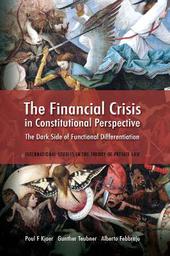
|
The Financial Crisis in Constitutional Perspective: The Dark Side of Functional Differentiation
Hardback
Main Details
| Title |
The Financial Crisis in Constitutional Perspective: The Dark Side of Functional Differentiation
|
| Authors and Contributors |
Edited by Poul F Kjaer
|
|
Edited by Gunther Teubner
|
|
Edited by Alberto Febbrajo
|
| Series | International Studies in the Theory of Private Law |
|---|
| Physical Properties |
| Format:Hardback | | Pages:464 | | Dimensions(mm): Height 234,Width 156 |
|
| ISBN/Barcode |
9781841130101
|
| Classifications | Dewey:346.082 |
|---|
| Audience | | Tertiary Education (US: College) | | Professional & Vocational | |
|---|
|
Publishing Details |
| Publisher |
Bloomsbury Publishing PLC
|
| Imprint |
Hart Publishing
|
| Publication Date |
27 July 2011 |
| Publication Country |
United Kingdom
|
Description
This volume presents the first thorough sociologically-informed legal analysis of the financial crisis which unfolded in 2008. It combines a multitude of theoretically informed analyses of the causes, dynamics and reactions to the crisis and contextualises these within the general structural transformations characterising contemporary society. It furthermore explores the constitutional implications of the crisis and suggests concrete changes to the constitutional set-up of contemporary society. Although the question of individual responsibility is of crucial importance, the central idea animating the volume is that the crisis cannot be reduced to a mere failure of risk perception and management for which individual and collective actors within and outside of financial organisations are responsible. The 2008 crisis should rather be understood as a symptom of far deeper structural transformations. For example contemporary society is characterised by massive accelerations in the speed with which societal processes are reproduced as well as radical expansions in the level of globalisation. These transformations have, however, been asymmetrical in nature insofar as the economic system has outpaced its legal and political counterparts. The future capability of legal and political systems to influence economic reproduction processes is therefore conditioned by equally radical transformations of their respective operational forms and self-understanding. Potentially the 2008 crisis, therefore, has far-reaching constitutional implications.
Author Biography
Poul F Kjaer is Alexander von Humboldt Fellow at the Cluster of Excellence: Formation of Normative Orders, Goethe University Frankfurt am Main. Gunther Teubner is Professor of Law and Principal Investigator at the Cluster of Excellence: Formation of Normative Orders, Goethe University Frankfurt am Main and Distinguished Professor at the International University College, Torino. Alberto Febbrajo is Professor of Sociology and Anthropology of Law at the University of Macerata, Italy.
Reviews...a welcome addition to this scholarship. It presents the first systems-theoretical analysis of this topic. One of the chief virtues of this book is that it avoids becoming entangled in the details of the regulatory responses in the aftermath of the global financial crisis. Instead, the authors step back and attempt to shed light on the deeper problems that led to the latest financial turmoil and the challenges ahead. Another particularly admirable quality of this edited volume is that it challenges the common orthodoxy that sees the latest crisis as a failure of risk perception and management. The book convincingly demonstrates that the financial crisis of 2008 is a symptom of deeper structural transformations. An interesting feature of this book is that it integrates a range of insights from the discipline of economics ...the volume is an exemplary case of scholarly work that demonstrates the explanatory power of systems theory. In short, this edited volume contains a host of sophisticated and insightful essays which are worth reading. -- Andromachi Georgosuli * International Journal of Constitutional Law, Volume 10, No. 4 * ...an excellent and varied analysis of the financial crisis from an original and much inexplored standpoint, tackling a widely covered (and unfortunately still extremely topical) issue from a totally new perspective. The book does so in a thorough and engaging way and one that benefits from significant sociological knowledge, becoming of interest to anyone wishing to understand more about theoretical and practical aspects of the constitutional dimension of the crisis which unfolded in 2008. It will be a valuable addition to the libraries of scholars, policy-makers, students and anyone interested in better understanding the financial crisis and the constitutional processes alike. -- Giorgio Tosetti Dardanelli * European Journal of Risk Regulation, Volume 2 * If crisis is the key concern and pivot of the collection, the question of what constitutes a crisis, on what register, is the specific theme of a number of contributions of the book. The essays by Jean Clam and Dirk Baecker are demanding pieces of conceptual analysis,...Chris Thornhill's important contribution here ... tracks the shifting articulation of political power in society from 'the State' to 'rights'...in relation to the meaning of crisis, for me the outstanding contribution is Hauke Brunkhorst's fine piece, in which he masterfully combines Luhmann, Habermas and Marx to develop an erudite analysis of the 'return of crisis'. -- Emilios Christodoulidis * Jurisprudence, Volume 4, Number 2 * ...sophisticated and insightful contributions... -- Cesare Pinelli * European Constitutional Law Review *
|